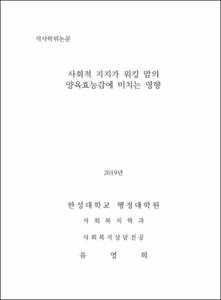사회적 지지가 워킹 맘의 양육효능감에 미치는 영향
= A Study on the Effect of Social Support on the Child-rearing Efficacy of Working Mothers
- Files in This Item:
-
-
Download
 200000216710.pdf
기타 데이터 / 1.09 MB / Adobe PDF
200000216710.pdf
기타 데이터 / 1.09 MB / Adobe PDF
-
Items in Repository are protected by copyright, with all rights reserved, unless otherwise indicated.